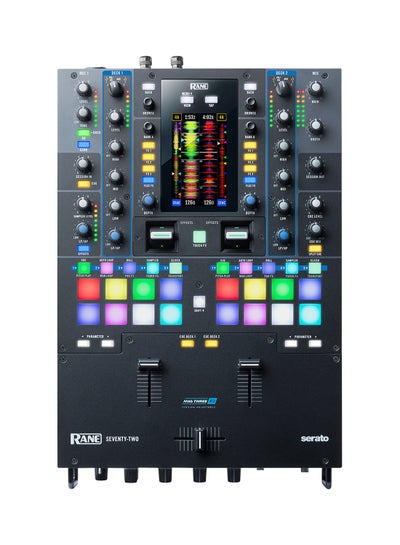
Running your mixer in the red can damage your sound system. This is usually a series of lights that move from green to yellow to red that alert you when the volume is too loud. Your DJ mixer needs to have some type of meter. Some mixers include a "full kill" option, which allows the DJ to completely silence a desired band of frequencies for a dramatic effect. The more bands your mixer has, the greater control you will have over the sound. Some mixers have two-band, others have three-band EQ. Most people are familiar with the two-band EQ on your radio: treble and bass. The EQ increases or decreases the volume of a specific band of frequencies. The more output options that are available to you, the greater the flexibility you will have with your mixer. The output jack can go to a headphone, it can go to a sound system, a stage monitor, or it can even go to a recorder. Outputs are where you connect to hear the mix. Your mixer should have a volume control for each channel as well as a master volume slider. Volume is how loud the sound is when it leaves your mixer. Your DJ mixer should have a gain control for each channel. You have to be careful with gain because turning it up too high will distort the sound before it even goes into your mixer, and no matter how much you turn down the volume, the sound will remain distorted. Gain is how you adjust the volume on the way into your mixer.

Because some channels may have multiple inputs, the number of inputs and the number of channels are not usually the same.

You may also have an XLR, quarter-inch, mini, and USB inputs. DJ mixers should have at least two stereo RCA inputs. Inputs are how you physically connect your sound source to your mixer. The more sound sources that you have, the more channels you will need. If you have two music players and a microphone, your DJ mixer will need a minimum of three channels.

The following is a list of controls and features that the best DJ mixers have: ChannelsĮach sound you want to mix needs its own channel. The best way to choose the right DJ mixer for you is to understand the controls and features so you know exactly what you need. Nine features to considerĪlthough each DJ mixer performs the same basic task - blending sounds from two or more sources - each has a slightly different focus. Some DJs can make $100 per hour doing weddings. When you get good, you can quickly turn DJing into a profitable side hustle.


 0 kommentar(er)
0 kommentar(er)
